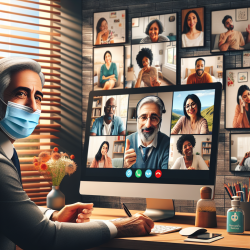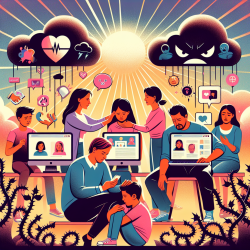The COVID-19 pandemic brought about a seismic shift in how couple and family therapists conduct their sessions. The research article "Couple and family therapists’ experiences with Telehealth during the COVID-19 pandemic: a phenomenological analysis" sheds light on the challenges and opportunities presented by this transition to telehealth.
One of the key findings from the research is the initial skepticism many therapists had towards telehealth. Concerns ranged from the perceived lack of therapeutic presence to technical difficulties and client confidentiality. However, as therapists adapted, many discovered unexpected benefits. For instance, telehealth allowed therapists to see clients in their natural environments, providing deeper insights into family dynamics.
Therapists also found innovative ways to build and maintain therapeutic alliances. Despite the slower development of alliances, therapists employed strategies such as using virtual backgrounds to create a professional atmosphere, adjusting camera angles to maintain eye contact, and even incorporating humor to bridge the virtual gap.
One notable challenge was addressing split alliances within families. The lack of nonverbal cues made it difficult to gauge and repair these rifts. Therapists had to rely more on verbal communication and be more directive to manage sessions effectively.
Despite these challenges, the research highlights several advantages of telehealth. These include increased client comfort and safety, practical benefits like reduced no-shows, and the ability to work with clients who might otherwise be geographically inaccessible. The ability to observe clients in their home settings also allowed for more natural assessments of family dynamics.
However, telehealth is not without its drawbacks. Loss of nonverbal information, increased likelihood of interruptions, and privacy concerns were common issues. Therapists also noted that some interventions were less effective online, and there was a general uncertainty about the comparative effectiveness of telehealth versus in-person therapy.
As the pandemic wanes and in-person therapy becomes an option again, therapists must weigh the advantages and disadvantages of telehealth. The experiences gained during this period can help therapists make informed decisions about when and how to use telehealth in their practice.
For therapists looking to improve their telehealth skills, this research provides valuable insights. It underscores the importance of being adaptable, innovative, and empathetic in a virtual setting. By embracing the lessons learned during the pandemic, therapists can continue to provide effective and meaningful care to their clients.
To read the original research paper, please follow this link: Couple and family therapists’ experiences with Telehealth during the COVID-19 pandemic: a phenomenological analysis.










